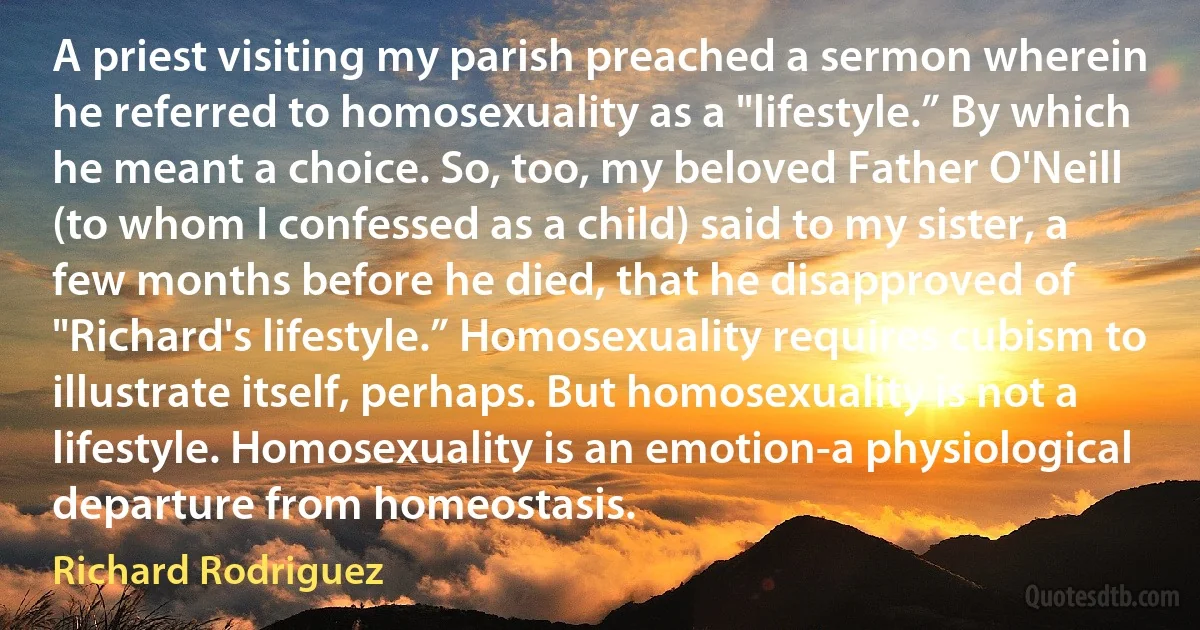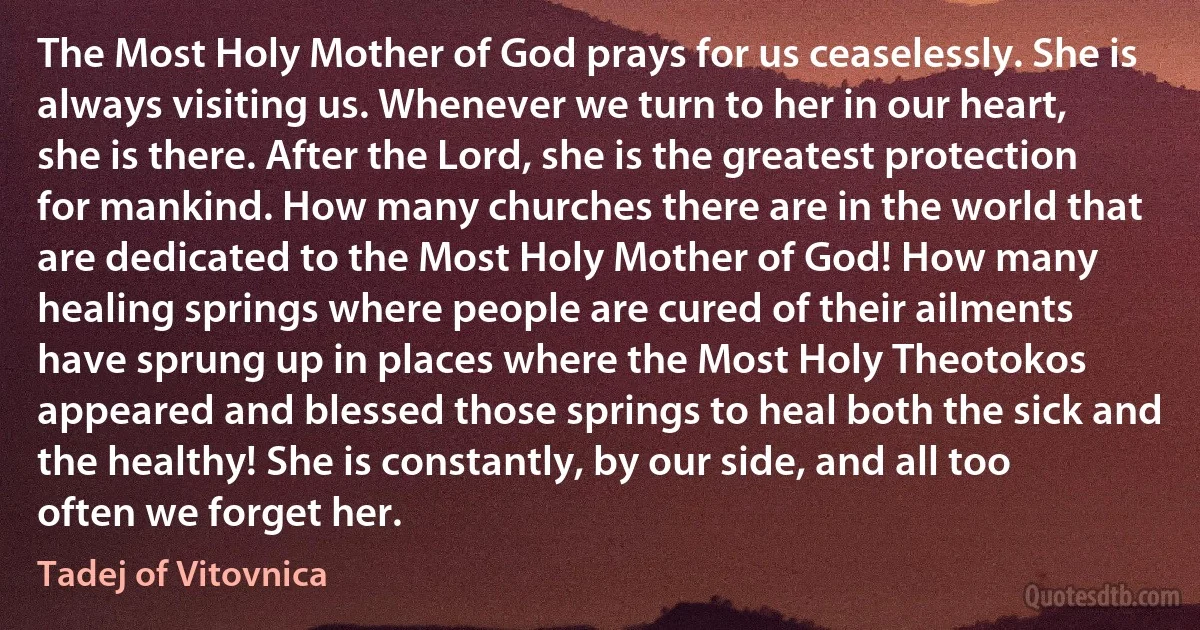Visiting Quotes - page 8
All my work is informed by personal experience. It is the seed to which I apply a transcendent dialogue. The idea for my first bubble machine was rooted in a complex combination of many memories. During the Second World War I was in my sister's arms when I saw a young Filipino guerrilla shot by a Japanese soldier. The young guerrilla ran into our garden. The sight of him lying there dying, red blood bubbles foaming from his mouth, made a strong impression on me. Flying over the Grand Canyon on my first trip to America, visiting a soap factory at the bottom of Notre Dame de la Garde in Marseilles, a visit to a brewery in Edinburgh in Scotland: these left deep impressions as well. My mother cooking "guinataan”, a Philippine dessert made of coconut milk and tropical fruit, and the movement of clouds over Manila Bay near where I was born, inspired me to create a work of art that would express and embody the motion of clouds.

David Medalla
The awful shadow of some unseen Power
Floats though unseen among us; visiting
This various world with as inconstant wing
As summer winds that creep from flower to flower;
Like moonbeams that behind some piny mountain shower,
It visits with inconstant glance
Each human heart and countenance;
Like hues and harmonies of evening,
Like clouds in starlight widely spread,
Like memory of music fled,
Like aught that for its grace may be
Dear, and yet dearer for its mystery.

Percy Bysshe Shelley
I think we in the mainstream media - especially cable television - sometimes bungled coverage of Trump. There was too much uncritical television coverage of Trump because he was good for ratings; then there was not enough investigation of his business dealings, racism and history of sexual assaults, and too much false equivalency that equated the two candidates as equally flawed. More broadly, we in the mainstream media are out of touch with working-class America; we spend too much time chatting up senators, and not enough visiting unemployed steel workers. Yet for all of our sins in the mainstream media, these alt-right websites are both far more pernicious and increasingly influential.

Nicholas D. Kristof
I condemn in strongest possible terms, the murder of Jennifer Laude (Jeffrey Laude). The police and prosecutors should act fast, lest the prescriptive period to be breached. In the meantime, as before, I call on and urge the Department of Foreign Affairs (DFA) to revisit and seek the amendment of the lopsided criminal jurisdiction provision of the Visiting Forces Agreement.

Francis Escudero
Secretary of War Stimson, visiting my headquarters in Germany, informed me that our government was preparing to drop an atomic bomb on Japan. I was one of those who felt that there were a number of cogent reasons to question the wisdom of such an act. ...the Secretary, upon giving me the news of the successful bomb test in New Mexico, and of the plan for using it, asked for my reaction, apparently expecting a vigorous assent.
During his recitation of the relevant facts, I had been conscious of a feeling of depression and so I voiced to him my grave misgivings, first on the basis of my belief that Japan was already defeated and that dropping the bomb was completely unnecessary, and secondly because I thought that our country should avoid shocking world opinion by the use of a weapon whose employment was, I thought, no longer mandatory as a measure to save American lives. It was my belief that Japan was, at that very moment, seeking some way to surrender with a minimum loss of 'face.

Dwight D. Eisenhower
Great as was my wonderment [visiting the 8th Impressionist Exhibition, May/June 1886, at 1, rue Laffitte in Paris] it was tenfold increased on discovering that only six of these pictures were painted by the new man, Seurat, whose name was unknown to me; the other five were painted by my old friend Pissarro.. .The pictures were hung low, so I went down on my knees and examined the dotting in the pictures signed Seurat, and the dotting in those that were signed, Pissarro. After a strict examination I was able to detect some differences, and I began to recognize the well-known touch even through this most wild and most wonderful transformation. Yes, owing to a long and intimate acquaintance with Pissarro and his work, I could distinguish between him and Seurat, but to the ordinary visitor their pictures were identical.

Georges Seurat
How come you write the way you do?” an apprentice writer in my Johns Hopkins workshop once disingenuously asked Donald Barthelme, who was visiting. Without missing a beat, Donald replied, "Because Samuel Beckett was already writing the way he does.”
Asked another, likewise disingenuosly, "How can we become better writers than we are?”
"For starters," DB advised, "read through the whole history of philosophy, from the pre-Socratics up through last semester. That might help.”
"But Coach Barth has already advised us to read all of literature, from Gilgamesh up through last semester....”
"That, too,” Donald affirmed, and turned on that shrewd Amish-farmer-from-West-Eleventh-Street twinkle of his. "You're probably wasting time on things like eating and sleeping. Cease that, and read all of philosophy and all of literature. Also art. Plus politics and a few other things. The history of everything.

Donald Barthelme
Prince Antoine Bibesco, when asked (by her mother, Margot Asquith) why his wife didn't do more "good works", such as visiting a hospital, replied, "Dearest Margot, Elizabeth visits a hospital three times a week, with the result that the lame walk, the blind see, and the dumb would speak if they could get a word in edgeways."

Elizabeth Bibesco
I hope that our discussion of meaning-making and ethics-making has made it clear why we must stand firm in disputing god-talk: god-talk is at once a betrayal of our common humanity and a barrier to both meaning and ethics. That is not to say that you rise up in arms when you are visiting your parents' home for dinner and grace is said or that you leap into the fray every time you hear some piety uttered. No one has the time or the energy for such vigilance, and no one wants to become a pariah. But you do need to pick some fights and then fight them. If you are upholding values such as justice, reason, fairness, equity, and decency-if these inform the meaning and the ethics that you make-then you are obliged to stand up to god-talk at least occasionally.

Eric Maisel
After visiting the school, we attended mass at Sacred Heart Catholic Church with Father Eddie.
In the pews, families and friends held each other tightly. As Archbishop Gustavo spoke, he asked the children in attendance to come up on the altar and sit on the altar with him as he spoke.
There wasn't enough room, so a mom and her young son sat next to Jill and me in the first pew. And as we left the church, a grandmother who had just lost her granddaughter passed me a handwritten letter.
It read, quote, "Erase the invisible line that is dividing our nation. Come up with a solution and fix what's broken and make the changes that are necessary to prevent this from happening again.” End of quote.
My fellow Americans, enough. Enough. It's time for each of us to do our part. It's time to act.
For the children we've lost, for the children we can save, for the nation we love, let's hear the call and the cry. Let's meet the moment. Let us finally do something.

Joe Biden
The awful shadow of some unseen Power
Floats though unseen among us,-visiting
This various world with as inconstant wing
As summer winds that creep from flower to flower,-
Like moonbeams that behind some piny mountain shower,
It visits with inconstant glance
Each human heart and countenance .
Spirit of Beauty, that dost consecrate
With thine own hues all thou dost shine upon
Of human thought or form,-where art thou gone?

Percy Bysshe Shelley
THIS house in which you are visiting today is not a personal residence. And it must never be a political prize. This house is the house of all the people. For so long as I am your tenant--and your servant--I shall use this house as we are using it today: use it to bring together America's leaders from all walks of American life, to think together, to plan together, to work together for the future of America. As President, I would much rather explain why leaders of labor--or leaders of business-are in their White House, than to try to explain why either are not here or weren't invited.

Lyndon B. Johnson


